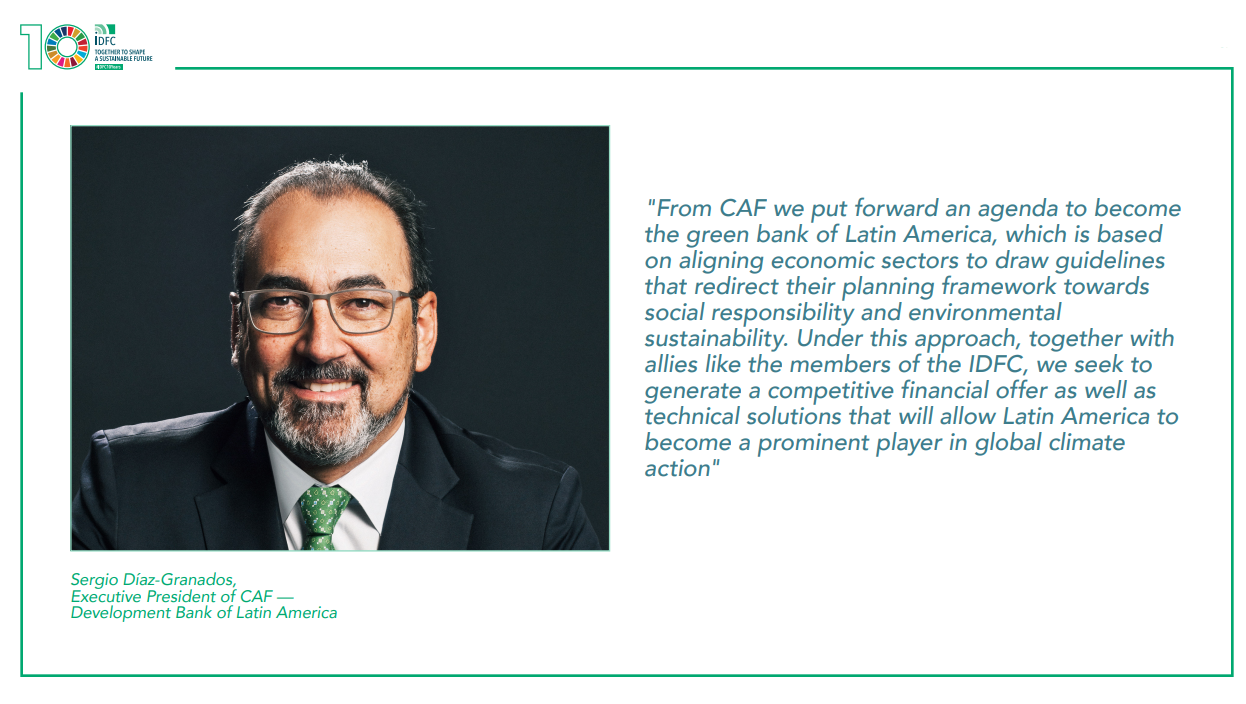IDFC Facility

Objectives, activities and value added of the IDFC Facility
Why this Facility?
The IDFC Facility is supporting IDFC members in doing more and better climate finance and getting aligned with the goals of the Paris Climate Agreement, particularly by enhancing knowledge exchange between members and capacity development on climate-related topics.
The IDFC Facility benefitted from significant contributions from our members and strategic partners. Thus, AFD, the French Development Agency is hosting and administrating the IDFC Facility since its creation. The Green Climate Fund (GCF) contributed for an amount of US$ 700 000 to the IDFC Facility while closely working with the CU in different capacity building activities. Lastly, in 2021, the Development bank of Latin America (CAF) has awarded a US$ 1 million grant to the IDFC CF to support climate change initiatives globally.
The IDFC created an IDFC Facility as an operational and innovative tool to strengthen knowledge and leverage resources in the field of climate change mitigation and adaptation. The Facility aims at supporting IDFC members efforts:
- To further integrate climate change and SDG goals into their mandates, develop innovative and more flexible financial products, mainstream climate finance into operations, and develop private sector engagement.
- To reinforce collaboration and knowledge sharing between them.
Watch the replay of IDFC and its IDFC Facility Pavilion at COP27
How and when will it be implemented?
The Facility will be first implemented during a pilot phase of up to 4 years.
It shall then be extended and adapted based on the feedback from experience, capitalization work and IDFC members’ evolving needs. During the pilot phase, the Facility will focus on four activity lines:
- Knowledge sharing,
- Capacity building,
- Support to project preparation and
- Facilitation access to the Green Climate Fund

Knowledge Sharing Activities
Online knowledge library
The online library will gather, reference and organize knowledge material developed by IDFC members that may or may not be published externally, as well as additional relevant knowledge material from external sources. Information on members’ activities that cannot be found elsewhere will notably be available allowing members to better understand each member’s activities and opportunities for collaboration
Events & Networking
The IDFC Facility will organize regional and global forums (including workshops, presentations, trainings and networking sessions), which will institutionalize ways to collectively share knowledge, lessons learned and best practices. These sessions will not only be addressed to IDFC members, but also to relevant external stakeholders.
Online project market place
The online project market place will consist in an online platform where members’ projects can be promoted in order to attract co-financing partners among other members. Bridging the gap between supply and demand for climate finance with a large pool of national and regional players, bilaterals with global market outreach and National Development Banks (NDBs), this instrument presents a critical value added as “matchmaking” has not yet been tested by climate finance platforms and vehicles.
Capacity Building Activities
Training
The IDFC Facility will organize online and “in-person” training modules in response to IDFC members’ needs. Given the concentration of NDBs among IDFC members, the Facility will provide training tailored to the specific context of financial institutions, and offer a platform for exchange and harmonization of skills and practice standards. Thus, it will influence a significant range of countries and key players.
Read about the Climate Facility First Training Week hosted by TSKB in Istanbul
Mentoring Programme
The IDFC Facility will constitute a group of IDFC members’ staff ready to provide, as “coaches”, targeted support and expertise to other IDFC member’s employees. Beyond improving capacity, such a coaching programme will identify internal unexploited synergies and create a community of best-practice sharing, across regions and institutions.
IDFC Toolbox
The IDFC Toolbox will be a set of climate-related tools developed by/under the coordination of the IDFC Facility for IDFC members, which can be used for each step of the project cycle to ensure integration of climate considerations, opportunities and risks.
Support to Project Preparation
IDFC Collaborative projects
The Facility will provide resources to support in priority projects that are jointly developed by two or more IDFC members.
Innovative and demonstrative operations
The challenges posed by the climate change require identifying and implementing new efficient approaches. The Facility will support IDFC members’ efforts in adopting necessary new and innovative projects to address the magnitude of these challenges.
Cofinance with GCF
The facility will encourage IDFC members to seek for co-financing from GCF, and thus strengthening and scaling up the GCF objectives.
Facilitation of access to International Climate Fund
GCF Readiness Project
The Facility will support IDFC members willing to be accredited, access and manage Green Climate Fund resources by the GCF.
The pilot phase started in September 2019. A gradual scale up of activities is expected until 2021 when the Facility will operate at full capacity. The Facility will take IDFC members to a higher level of partnership and cooperation.
What are the expected impacts of the Facility?
- Increased resources to implement the Paris Agreement,
- Upgraded knowledge management and communication on climate change and climate action,
- Fostered multi-actor partnerships between development banks from developed and developing countries as well as with private actors;
- Enhanced private sector engagement and mobilization of local and international capital;
- Improved complementarities and synergies among members’ activities;
- Coherence and complementarity in the operationalization of climate related projects;
- Strengthened capacity of development banks to originate, structure and deliver climate change projects to grow their pipeline;
- Enhanced pooling of resources for greater impact;
- Accelerated alignment of finance with low carbon and climate resilient development to support the implementation of global agendas on climate,
- Improved quality of and infused innovation into financed projects.